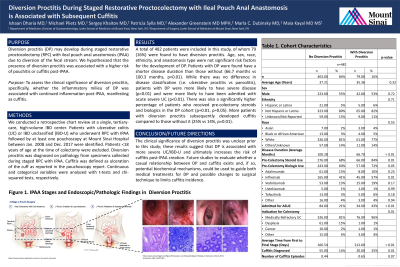Monday Poster Session
Category: IBD
P2614 - Diversion Proctitis During Staged Restorative Proctocolectomy with Ileal Pouch Anal Anastomosis is Associated with Subsequent Cuffitis
Monday, October 28, 2024
10:30 AM - 4:00 PM ET
Location: Exhibit Hall E

Has Audio
- ID
Ishaan Dharia, MD
Icahn School of Medicine at Mount Sinai
New York, NY
Presenting Author(s)
Ishaan Dharia, MD, Michael Plietz, MD, Sergey Khaitov, MD, Patricia Sylla, MD, Alexander Greenstein, MD, MPH, Marla C. Dubinsky, MD, Maia Kayal, MD, MS
Icahn School of Medicine at Mount Sinai, New York, NY
Introduction: Diversion proctitis (DP) may develop during staged restorative proctocolectomy (RPC) with ileal pouch anal anastomosis (IPAA) due to diversion of the fecal stream. The purpose of this study was to assess the clinical significance of diversion proctitis, specifically, whether the inflammatory milieu of DP was associated with continued inflammation post-IPAA, manifesting as cuffitis.
Methods: We conducted a retrospective chart review at a single, tertiary-care, high-volume IBD center. Patients with ulcerative colitis (UC) or IBD unclassified (IBD-U) who underwent RPC with IPAA followed by at least one pouchoscopy at Mount Sinai Hospital between Jan. 2008 and Dec. 2017 were identified. Patients < 18 years of age at the time of colectomy were excluded. Diversion proctitis was diagnosed on pathology from specimens collected during IPAA creation and cuffitis was defined as ulceration of the cuff as reported in the pouchoscopy report. Continuous and categorical variables were analyzed with t-tests and chi-squared tests, respectively.
Results: A total of 482 patients were included in this study, of whom 79 (16%) were found to have diversion proctitis. Age, sex, race, ethnicity, and anastomosis type were not significant risk factors for the development of DP. Patients with DP were found have a shorter disease duration than those without (66.7 months vs 100.3 months, p< 0.01). While there was no difference in disease classification (i.e. ulcerative proctitis vs pancolitis), patients with DP were more likely to have severe disease (p=0.01) and were more likely to have been admitted with acute severe UC (p< 0.01). There was also a significantly higher percentage of patients who received pre-colectomy steroids and biologics in the DP cohort (p=0.01, p=0.05). More patients with diversion proctitis subsequently developed cuffitis compared to those without it (25% vs 14%, p=0.01).
Discussion: This study identified risk factors for the development of DP during staged RPC with IPAA and demonstrated an association between DP and subsequent cuffitis. These results suggest that providers should have a higher clinical suspicion for cuffitis in patients with prior DP.
Disclosures:
Ishaan Dharia, MD, Michael Plietz, MD, Sergey Khaitov, MD, Patricia Sylla, MD, Alexander Greenstein, MD, MPH, Marla C. Dubinsky, MD, Maia Kayal, MD, MS. P2614 - Diversion Proctitis During Staged Restorative Proctocolectomy with Ileal Pouch Anal Anastomosis is Associated with Subsequent Cuffitis, ACG 2024 Annual Scientific Meeting Abstracts. Philadelphia, PA: American College of Gastroenterology.
Icahn School of Medicine at Mount Sinai, New York, NY
Introduction: Diversion proctitis (DP) may develop during staged restorative proctocolectomy (RPC) with ileal pouch anal anastomosis (IPAA) due to diversion of the fecal stream. The purpose of this study was to assess the clinical significance of diversion proctitis, specifically, whether the inflammatory milieu of DP was associated with continued inflammation post-IPAA, manifesting as cuffitis.
Methods: We conducted a retrospective chart review at a single, tertiary-care, high-volume IBD center. Patients with ulcerative colitis (UC) or IBD unclassified (IBD-U) who underwent RPC with IPAA followed by at least one pouchoscopy at Mount Sinai Hospital between Jan. 2008 and Dec. 2017 were identified. Patients < 18 years of age at the time of colectomy were excluded. Diversion proctitis was diagnosed on pathology from specimens collected during IPAA creation and cuffitis was defined as ulceration of the cuff as reported in the pouchoscopy report. Continuous and categorical variables were analyzed with t-tests and chi-squared tests, respectively.
Results: A total of 482 patients were included in this study, of whom 79 (16%) were found to have diversion proctitis. Age, sex, race, ethnicity, and anastomosis type were not significant risk factors for the development of DP. Patients with DP were found have a shorter disease duration than those without (66.7 months vs 100.3 months, p< 0.01). While there was no difference in disease classification (i.e. ulcerative proctitis vs pancolitis), patients with DP were more likely to have severe disease (p=0.01) and were more likely to have been admitted with acute severe UC (p< 0.01). There was also a significantly higher percentage of patients who received pre-colectomy steroids and biologics in the DP cohort (p=0.01, p=0.05). More patients with diversion proctitis subsequently developed cuffitis compared to those without it (25% vs 14%, p=0.01).
Discussion: This study identified risk factors for the development of DP during staged RPC with IPAA and demonstrated an association between DP and subsequent cuffitis. These results suggest that providers should have a higher clinical suspicion for cuffitis in patients with prior DP.
Disclosures:
Ishaan Dharia indicated no relevant financial relationships.
Michael Plietz indicated no relevant financial relationships.
Sergey Khaitov indicated no relevant financial relationships.
Patricia Sylla indicated no relevant financial relationships.
Alexander Greenstein indicated no relevant financial relationships.
Marla Dubinsky: AbbVie – Consultant. Abivax – Consultant. Arena – Consultant. AstraZeneca – Consultant. Bristol Myers Squibb – Consultant. Celgene – Consultant. Eli Lilly – Consultant. Genentech – Consultant. Gilead – Consultant. Janssen – Consultant. Pfizer Inc – Consultant. Prometheus Labs – Consultant. Takeda – Consultant.
Maia Kayal: Abbvie – Consultant. Johnson&Johnson – Advisory Committee/Board Member. Pfizer – Advisory Committee/Board Member.
Ishaan Dharia, MD, Michael Plietz, MD, Sergey Khaitov, MD, Patricia Sylla, MD, Alexander Greenstein, MD, MPH, Marla C. Dubinsky, MD, Maia Kayal, MD, MS. P2614 - Diversion Proctitis During Staged Restorative Proctocolectomy with Ileal Pouch Anal Anastomosis is Associated with Subsequent Cuffitis, ACG 2024 Annual Scientific Meeting Abstracts. Philadelphia, PA: American College of Gastroenterology.
